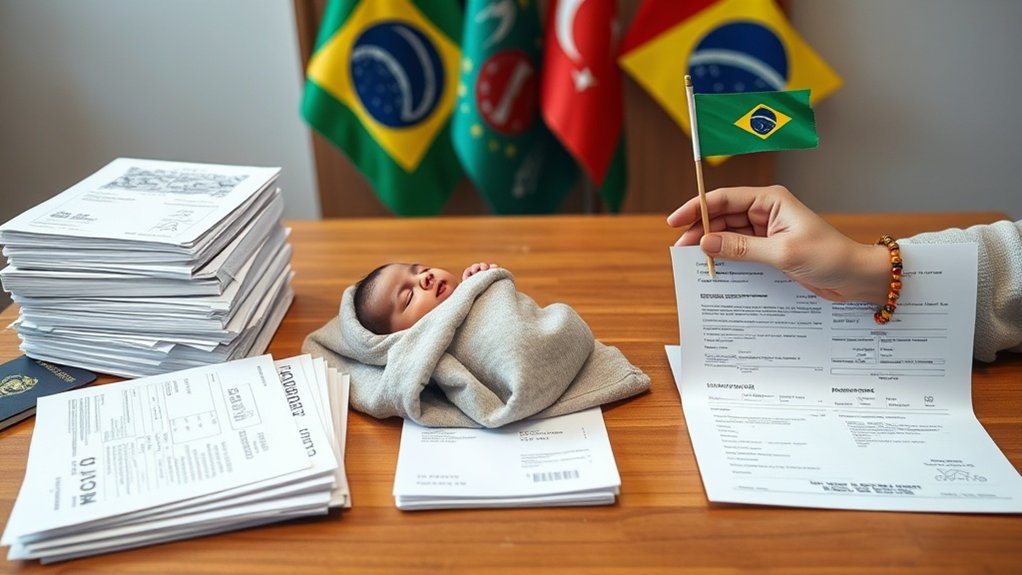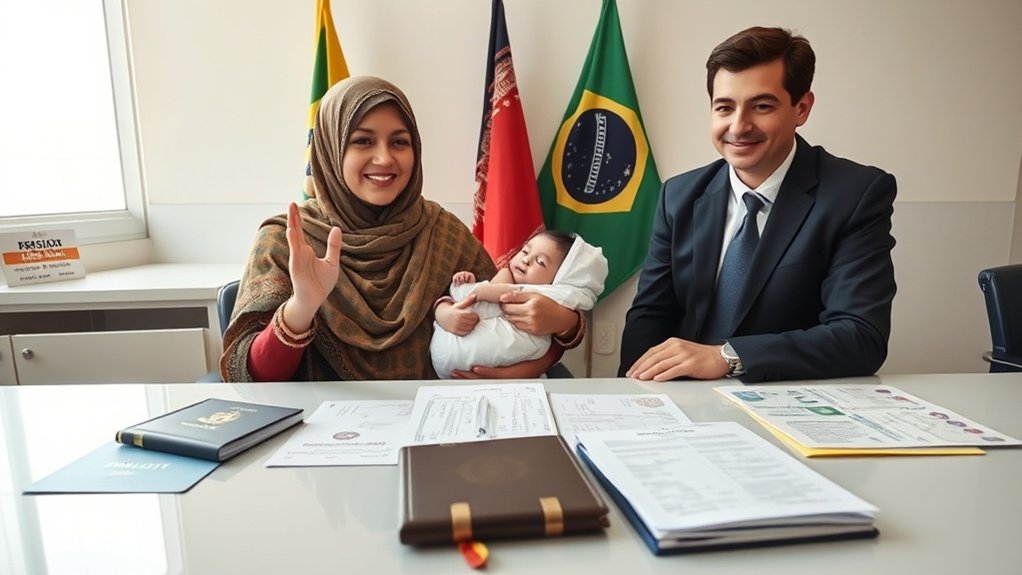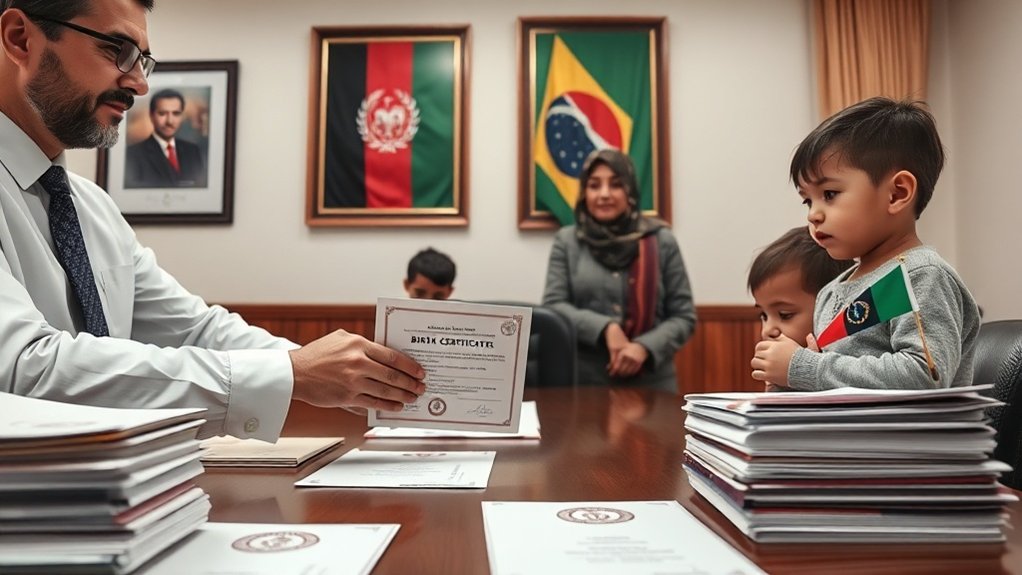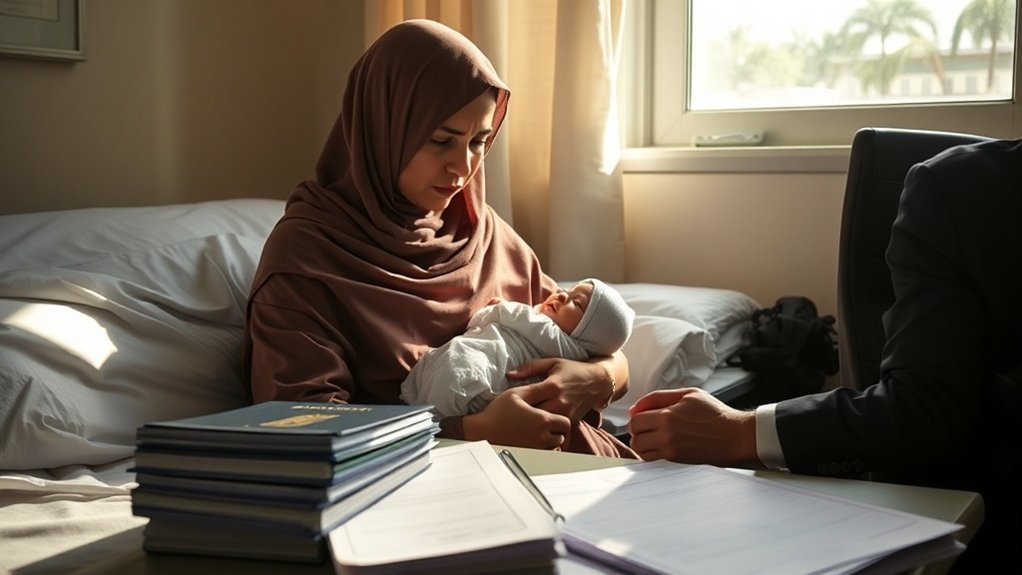If you’re an Afghan parent welcoming a child in Brazil, you’ll face specific steps to secure your newborn’s legal status and future. Registering a birth abroad isn’t just about paperwork—it’s about understanding local rules, gathering the right documents, and navigating possible language hurdles. You might wonder if your child can have dual citizenship or what protections are available. There are important decisions ahead, and knowing where to start makes all the difference…
Understanding Birth Registration Laws for Foreign Nationals in Brazil

Although Brazil welcomes people from around the world, its birth registration laws can be complex for foreign nationals. If you’re an Afghan parent living in Brazil, you’ll need to understand how local regulations affect your child’s legal status and documentation. Brazilian law requires you to register any birth that occurs within the country, regardless of the parents’ nationality or immigration status. If you don’t comply promptly, you might face delays or complications in securing essential documents for your newborn.
You should also be aware that registration processes can differ depending on your immigration situation and the documentation you present. Authorities will usually need valid identification and proof of residence from both parents. Sometimes, challenges arise if one parent can’t be present, or if your documents aren’t in Portuguese. By familiarizing yourself with Brazil’s legal expectations, you’ll avoid misunderstandings and ensure your child’s rights and recognition from the moment they are born.
Consulting a specialized immigration lawyer can make the process easier and help prevent errors, as Brazilian immigration laws are often complicated and recently updated.
Procedures for Registering Afghan Newborns With Brazilian Authorities
Once your child is born in Brazil, you’ll need to begin the registration process as soon as possible to secure their legal identity. Head to the local Civil Registry Office (Cartório de Registro Civil) closest to the hospital or your place of residence. The process is straightforward but must be done within 15 days from birth. If both parents can’t appear together, one parent’s presence with identification suffices. When you arrive, inform the registrar that your child is of Afghan descent so they can note the nationality accurately on the birth certificate.
You don’t need a lawyer for this process—you’ll interact directly with registry officials. The entire conversation typically happens in Portuguese, so if you’re not fluent, consider bringing someone to assist with interpretation. The registrar will issue an official birth certificate, which serves as your child’s first legal document in Brazil. Securing this certificate ensures future access to health care, education, and legal rights. If you have questions about more complex immigration issues, seeking specialized legal support can help you navigate documentation, deadlines, and avoid mistakes that might affect your family’s status.
Key Documents Required for Afghan Birth Registration

To register your Afghan child’s birth in Brazil, you’ll need to gather key documents. Make sure you have valid parental identification, proof of Afghan descent, and follow the steps for securing a Brazilian birth certificate. Let’s walk through what’s required at each stage. For additional guidance and oversight, it is advisable to seek help from immigration lawyers in SP to ensure your documentation and process comply fully with Brazilian law.
Essential Parental Identification Papers
When registering an Afghan birth in Brazil, you’ll need to present specific parental identification papers to complete the process. First, make sure you have both parents’ valid passports or, if unavailable, official Afghan identity documents such as a tazkira. The registry office will ask for the originals and often certified Portuguese translations. If either parent’s identification has expired, Brazilian authorities may still consider it, but it’s better to provide current documents to avoid complications. You’ll also need marriage certificates if the parents are married, preferably with Portuguese translations. Consistency of names and data is crucial; any discrepancies can delay registration. Bring all documents in good condition, as damaged papers may be rejected. Always keep extra copies on hand for both you and the registry. To increase your chances of success and reduce the risk of delays or issues, it’s advisable to consult a lawyer who understands the complexity and constant updates of Brazilian immigration laws.
Proof of Afghan Descent
Although having proper identification is crucial, Brazilian authorities also require clear proof of Afghan descent to register an Afghan birth. You must provide official documents that verify your Afghan heritage, especially when registering your child as having Afghan nationality. Don’t assume identification alone will suffice—authorities want to see concrete evidence that links you to Afghanistan. Typically, you’ll need documents that confirm both parental lineage and Afghan origin.
To clearly establish Afghan descent, present:
- Afghan passports or national ID (Tazkira): These demonstrate your connection to Afghanistan and provide personal details.
- Afghan birth certificates: These show your Afghan place of birth and parental information.
- Consular certificates issued by the Afghan Embassy: If other documents are lacking, consular authentication may be accepted as supplementary proof.
Gather these key records before starting the registration process. Having specialized legal support can also streamline the documentation process and increase the likelihood of your child’s registration being accepted successfully.
Brazilian Birth Certificate Steps
After gathering documents that confirm your Afghan heritage, you’ll need to follow specific steps to register your child’s birth in Brazil. First, visit the nearest Civil Registry Office with both parents’ identification—your Afghan passport or ID, and any available Brazilian documentation. You’ll also need your marriage certificate if available, or proof of marital status. Bring the hospital-issued birth statement (Declaração de Nascido Vivo, or DNV), which the hospital will give you after delivery.
Make sure all foreign documents are officially translated into Portuguese and legalized. At the registry office, present your documents, fill out the required forms, and provide any necessary witnesses. After verification, the office will issue an official Brazilian birth certificate, recording your child’s identity, parentage, and birth details, ensuring their legal recognition in Brazil. It’s important to seek specialized legal guidance during this process to avoid complications with document legalization and ensure compliance with Brazilian requirements.

Because most Afghan mothers in Brazil don’t speak Portuguese, communication with healthcare providers becomes a significant challenge during pregnancy and childbirth. You may feel anxious about discussing sensitive medical information or making decisions, especially when there’s a language gap. Hospitals often lack Dari or Pashto interpreters, so you’ll need to find practical solutions for effective communication.
To navigate language barriers and translation needs, focus on these strategies:
- Bring a trusted bilingual friend or community member to appointments whenever possible.
- Use translation apps or printed phrase guides for important medical terms and phrases.
- Request professional medical interpreters through local NGOs or consulate resources.
Keeping your paperwork organized and translated is just as important when dealing with hospitals and civil registries. Always carry your identification and translations for key documents, such as passports or refugee paperwork. Being proactive about translation needs ensures clearer communication, helps prevent misunderstandings, and supports a smoother birth registration process for your child. If you are uncertain about proper translations or document requirements, seeking help from specialized legal support can help you navigate these complex immigration processes with greater confidence.
Determining Your Child’s Nationality and Dual Citizenship Options
When your child is born in Brazil, they automatically receive Brazilian citizenship. Because of Afghan descent, your child may also qualify for Afghan citizenship through jus sanguinis. It’s important to understand how dual citizenship works so you can make informed choices for your family. Consulting an immigration lawyer ensures you receive expert guidance on both Brazilian and Afghan nationality laws, as well as any documentation required for dual citizenship.
Brazilian Citizenship by Birth
Although you may have welcomed your child in Brazil, understanding how this affects their citizenship is essential. In Brazil, any child born on Brazilian soil automatically acquires Brazilian citizenship, no matter their parents’ nationalities. This principle is called jus soli or “right of the soil.” Your child will be recognized as a Brazilian citizen from birth, and this status comes with important rights and responsibilities.
With Brazilian citizenship, your child will:
- Have access to Brazilian public services, such as healthcare and education.
- Enjoy freedom to live, study, and work throughout Brazil.
- Be eligible to apply for a Brazilian passport, opening international travel possibilities.
You don’t need to give up your child’s Afghan heritage; Brazil permits dual citizenship, allowing your child to keep strong ties with both countries. If you later consider moving to the United States, it’s useful to understand there are pathways to permanent residency that are available for your family members based on employment or other criteria.
Afghan Descent and Jus Sanguinis
Alongside the automatic Brazilian citizenship your child receives at birth, it’s also important to consider their Afghan heritage. Through the principle of jus sanguinis, Afghanistan grants nationality based on descent. If you or your child’s other parent is an Afghan citizen, your child is generally eligible for Afghan nationality—even when born abroad in Brazil. You’ll need to prove Afghan lineage with appropriate documents, such as Afghan passports or birth certificates, when registering your child’s birth with Afghan authorities.
Knowing your child’s eligibility for Afghan nationality opens doors to multiple identity options. This dual background allows your child to maintain strong ties to both Brazil and Afghanistan. It’s essential that you understand and initiate the necessary steps early, ensuring your child can fully benefit from each heritage. Seeking specialized legal assistance increases the chances of properly navigating complex documentation and nationality requirements.
Dual Citizenship Legalities
Because your child acquires Brazilian citizenship by birth and is eligible for Afghan nationality through descent, you’re likely navigating the complexities of dual citizenship. Brazilian law allows dual nationality, so your child won’t lose their Brazilian rights if they claim Afghan citizenship. However, Afghanistan has its own requirements and possible restrictions. It’s crucial to understand the obligations and benefits of maintaining two nationalities, especially regarding legal status, travel, and future residency options. Here’s what you should consider:
- Legal obligations: Each country may expect compliance with its laws, including military service or taxes.
- Travel and documentation: Different passports may ease or restrict crossing certain borders.
- Future rights: Your child’s access to education, healthcare, and employment might vary by country.
Careful planning ensures the best options for your child’s future.
Addressing Statelessness Risks for Afghan Children Born in Brazil
Even when a child is born on Brazilian soil, Afghan parents can face unique challenges in ensuring their child’s right to a nationality. Brazilian law generally grants nationality to children born in Brazil unless their parents are foreign diplomats. However, Afghan parents may worry about gaps in documentation or about the loss of Afghan citizenship, creating a risk of statelessness—a situation where a child is left without any recognized nationality.
To address these risks, you must be proactive. Register your child’s birth promptly with Brazilian civil authorities, making sure all requested documents are complete and accurate. Avoid delays, as lacking proper documentation can complicate both Brazilian registration and any processes needed with Afghan authorities. Remember, statelessness can restrict your child’s access to fundamental rights like healthcare, education, and travel. By acting swiftly and keeping all records organized, you’ll secure your child’s legal protection and open doors to a safer, more stable future.
Role of the Afghan Embassy and Consulate in the Registration Process

When you need help with Afghan documentation for your child born in Brazil, the embassy can guide you through the paperwork. The consulate also plays a key part in confirming your child’s Afghan nationality. By working with both offices, you’ll make the registration process smoother and more secure.
Embassy Assistance in Documentation
Although Brazil offers its own pathways for registering newborns, the Afghan Embassy and Consulate play a crucial role in supporting Afghan families through the documentation process. When you’re living far from home, navigating local bureaucracy can feel overwhelming, especially when language and legal systems differ. The Embassy provides hands-on assistance to help you compile and verify the documents required by Brazilian authorities for your newborn’s registration. This support ensures your documents are recognized and properly processed.
Here’s how the Afghan Embassy and Consulate assist with documentation:
- Help you complete, translate, and authenticate necessary paperwork for your child’s birth registration.
- Offer guidance on gathering supporting documents from Afghanistan, if needed.
- Serve as a liaison with Brazilian notary offices, smoothing out any issues during the registration process.
This assistance streamlines your experience.
Consular Role in Nationality
As you navigate the registration of your child’s birth in Brazil, the Afghan Embassy and Consulate take an active role in securing your child’s right to Afghan nationality. You’ll need to inform the relevant consular authorities about the birth, usually by submitting official Brazilian documents that confirm your child’s birth details. The Consulate reviews your paperwork and guides you regarding the requirements for registering your child as an Afghan national.
They verify parental identity, Afghan citizenship, and make sure all information aligns with Afghan law. Once your application’s complete, the Consulate updates its records and forwards the notification to Afghan authorities. This step is crucial because it ensures your child has a recognized legal connection to Afghanistan, maintaining their entitlement to Afghan rights and documentation in the future.
How Vieira Braga Advogados Supports Afghan Families
Vieira Braga Advogados takes a hands-on approach in assisting Afghan families through the complexities of the Brazilian legal system. When you face unfamiliar procedures around registering your child’s birth, this legal team provides clarity and reassurance at every step. Their specialized knowledge in immigration and nationality laws helps you understand Brazilian requirements and navigate bureaucratic processes effectively.
You’ll benefit from their guidance whether you’re preparing documents, understanding deadlines, or meeting official requirements. They break down legal jargon, making it easier for you to make informed decisions for your family’s future. With Vieira Braga Advogados on your side, you won’t feel lost or overwhelmed.
Here’s how they can help you:
- Prepare and review all necessary documents for birth registration
- Advise on nationality and citizenship pathways for your child
- Represent you before Brazilian authorities to ensure your rights are protected
Their personalized support streamlines the process so you can focus on your family.
Common Challenges Faced During Birth Registration

Navigating birth registration in Brazil presents unique hurdles, especially for Afghan families unfamiliar with local bureaucracy. When you approach the registry office, you may immediately notice a language barrier. Forms and officials communicate in Portuguese, and translators aren’t always available. You’ll also find that required documents, such as Afghan passports or marriage certificates, often don’t match Brazilian standards or may be missing altogether due to displacement. This can lead to delays or outright refusals.
Another challenge arises if you’re unsure which documents prove your identity or legal status in Brazil. Without local guidance, it’s easy to submit incomplete paperwork. Officials might ask for documents you’ve never encountered before. Cultural differences might make the process feel intimidating or confusing, and you could encounter prejudice or a lack of understanding from staff. Recognizing these obstacles early will help you prepare, ensuring smoother interactions and increasing the likelihood of successful registration.
Preparing for the Future: Legal Protections and Rights for Afghan Newborns
Once your Afghan child’s birth is registered in Brazil, they gain access to critical legal protections and basic rights. These foundational steps aren’t just paperwork—they help secure your child’s future in a new country. With official registration, your child receives a Brazilian birth certificate, enabling access to social programs, healthcare, and education.
It’s important to understand that, as a legal resident or citizen, your child will enjoy the same protections under Brazilian law as any native-born child. This means you’re ensuring your child’s right to be safeguarded from discrimination, have access to necessary resources, and build a stable life.
Here’s what your efforts guarantee:
- Access to public healthcare and vaccination programs.
- Enrollment in Brazilian educational systems from early childhood through university.
- Protection under Brazilian child welfare laws and anti-discrimination statutes.
Frequently Asked Questions
How to register a birth in Brazil?
A birth must be registered at a Cartório de Registro Civil within 15 days (extendable to 60 in rural areas), with parents presenting IDs, proof of birth from the hospital, and residence details.
How can I get my birth certificate from Brazil?
You can request it directly at the cartório where the birth was registered or online via official registries, with certified copies available for legal use.
Can Afghan Parents Change Their Child’s Name After Birth Registration in Brazil?
Yes, you can change your child’s name after birth registration in Brazil, but you’ll need to follow specific legal procedures. You must file a request with a Brazilian Civil Registry Office, often explaining the reason for the change. If your child is under 18, both parents have to agree. The process could involve court approval, especially if it’s after the child’s first year. Make sure you gather and submit all necessary documents.
What Healthcare Services Are Available to Afghan Newborns in Brazil?
Your Afghan newborn in Brazil can access the same public healthcare services as any other child born in the country. Brazil’s Unified Health System (SUS) provides vaccinations, pediatric check-ups, newborn screenings, and emergency care for free. You’ll need to register your child at a local health post, and it helps if you have personal documents, but care won’t be denied if you don’t have everything immediately. Make sure to follow vaccination schedules and regular appointments.
Is Birth Registration Possible if the Afghan Parents Are Undocumented in Brazil?
Yes, you can register your child’s birth in Brazil even if you’re undocumented. Brazilian law protects a child’s right to birth registration regardless of the parents’ immigration status. Just go to the local civil registry office, present the baby and, if possible, any personal documents you may have. If you lack documents, officials may accept alternative proof or witnesses. This process ensures your child’s legal identity and access to essential rights.
How Long Does the Birth Registration Process Typically Take in Brazil?
The birth registration process in Brazil is usually straightforward and quick. You can generally expect it to take just a few days if you have all the necessary documents ready. Typically, you’ll go to the Civil Registry Office, provide the required paperwork, and the officials will register your child’s birth. If you’re missing documents or face legal complexities, the process might take a bit longer, but usually not more than a few weeks.
Are There Any Fees for Birth Registration or Document Translation in Brazil?
Yes, you can expect some fees for birth registration and document translation in Brazil. While initial birth registration at the civil registry is usually free if done within the legal deadline, late registrations often carry charges. If you need to translate foreign documents, you’ll have to pay a certified translator, and these costs vary. Always check with the specific registry office for current fees so you’re prepared and don’t face any surprises.
Conclusion
By understanding Brazil’s birth registration process and gathering the right documents, you’ll ensure your Afghan child’s rights and legal recognition from day one. With Vieira Braga Advogados by your side, you’re not alone—our team helps you navigate language barriers, compliance steps, and dual citizenship questions with confidence. Trust us to guide you through every detail, giving your growing family strong legal protection and peace of mind in Brazil. Your child’s future deserves nothing less.

